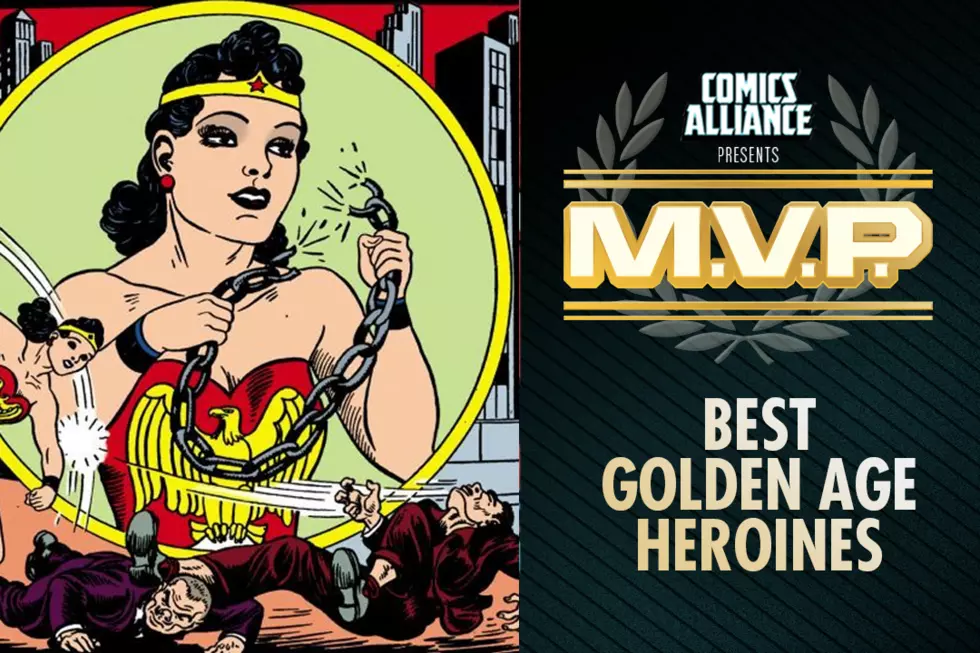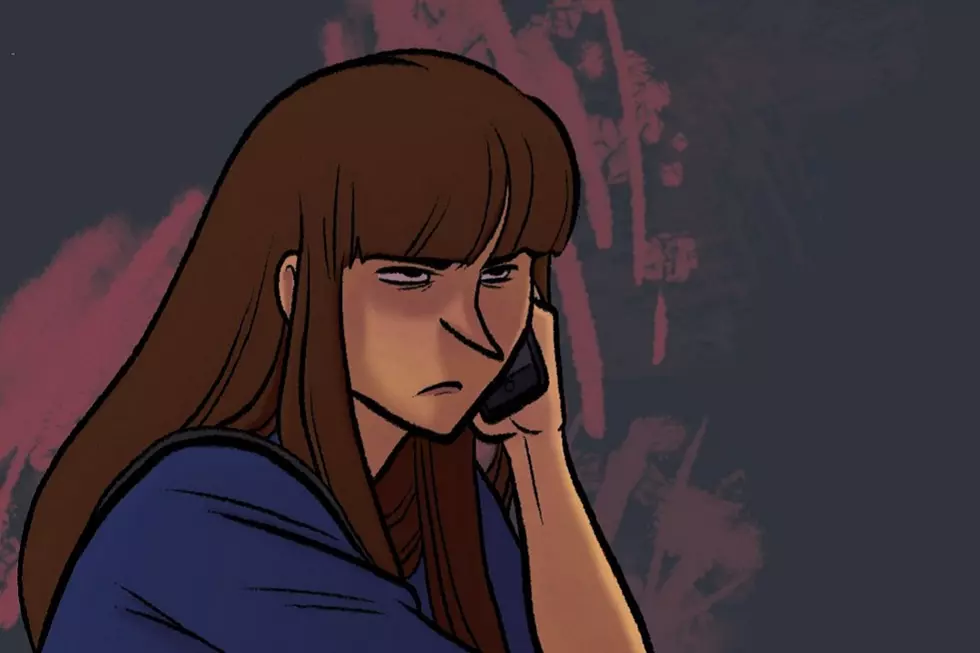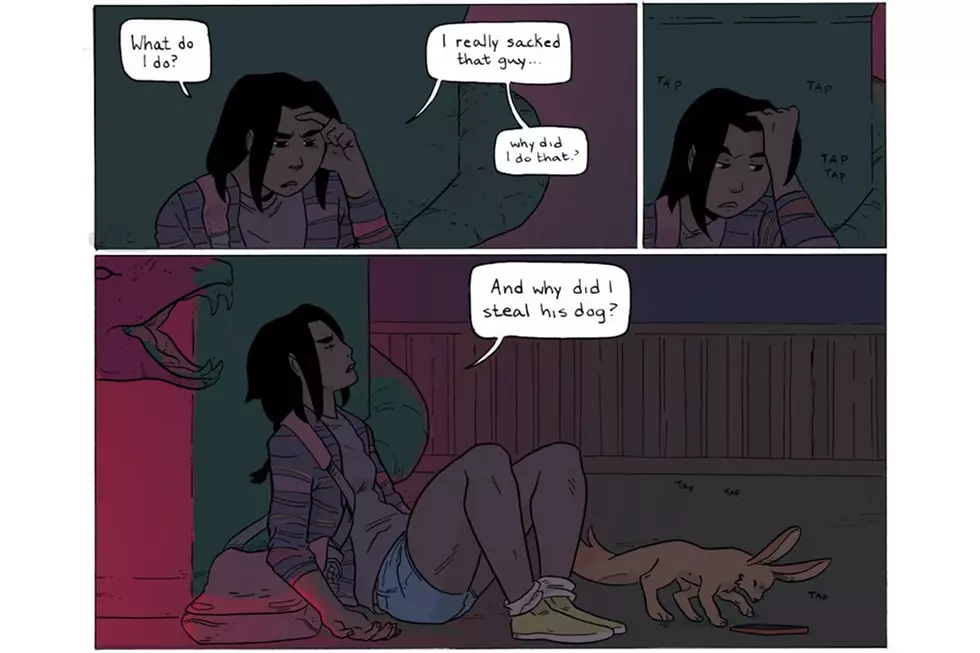
Fake Geek Guys: A Message to Men About Sexual Harassment
“I think this woman is wrong about something on the Internet. Clearly my best course of action is to threaten her with rape.”
That’s crazy talk, right? So why does it happen all the time?
Honest question, dudes.
That women are harassed online is not news. That women in comics and the broader fandom cultures are harassed online is not news. That these women are routinely transmitted anonymous messages describing graphic sexual violence perpetrated upon them for transgressions as grave as not liking a thing… that is actually news to me, and it’s probably news to a lot of you guys reading this.
But it’s not news to a lot of women I know, and to women whose work you’ve read here and around the Web. I know it’s not news to them because of the way they write about it. They describe the latest rape threat as plainly as a man like you or I might complain about a late train. It’s just a another lousy thing that happens. You know, life in the big city.
“I will find you. I will hurt you. I will physically violate you… for being wrong about Spider-Man.”
Can you imagine, gentlemen, receiving that threat from a potentially dangerous man whose identity you have no hope of discovering but who knows your name, what city you live in, what you look like and where you work?
Now imagine receiving messages like that from men so frequently that you’re no longer bothered by it.
Now understand how f*cked up it is that you’re no longer bothered by it; that you’re no longer bothered by men’s anonymous threats of brutal sexual violence, because they’ve become just as common as a train not arriving on time.
If you’re like me, you’re now beginning to understand the depressingly huge scope of this problem.
The Internet is a boon to humanity. It is also terrible. That is its special nature. Every cogent thought put forth has a dark, mindless twin — sometimes these twins are legion — ready to feed on a person’s idea and process it into the toxic waste found at the bottom of virtually any website you care to visit. We call them trolls, and anyone reading this site or others like it knows that popular art and its surrounding fandom attract a particularly nasty strain of them.
I’m not just talking about the trolls. I’m not just talking about the mischief makers, the haters, the contrarians or the pedants. What I’m also talking about is something much worse and heretofore all but invisible to me and many other men like me. I’m talking about this:
Women in comics are the deviation, the invading body, the cancer. We are the cure, the norm, the natural order. All you are is a pair of halfway decent tits, a c*nt and a loud mouth. But see, it doesn't matter how loud you get. It doesn't matter how many of your lezbo tumblr and twitter fangirl friends agree with you and reinforce your views. You can be all "I'm not going to be silent about misogyny so f*ck you!" all you want. In the end all you are is a pathetic little girl trying to effect change and failing to make a dent. You might as well try to drain the ocean of fish. That's the kind of battle you face with people like me. We won't quit. We won't stop attacking. We won't give up. Ever.
I’ve encountered such sentiments before, but it’s only recently that I’ve learned how common they are.
Those remarks were sent to Janelle Asselin, a ComicsAlliance contributor, professional comic book editor, and academic researcher. She posted them on her Facebook page, to which she's restricted public access for obvious reasons. I've republished the message here with her permission.
Ironically, the missive was transmitted anonymously via an online survey Janelle created to gather data on the prevalence of sexual harassment in the American comic book industry.
The man who wrote those words doubtlessly discovered Janelle’s survey by way of the misogynistic response to an article she wrote for another website critiquing the appeal of a superhero comic book cover. In her characteristically straightforward fashion, Janelle justified her opinion — that the cover was bad and spoke to a systemic badness with respect to marketing and audience — with reason and persuasive creative insight honed over years of professional experience. She pointed out, among other things, that the anatomy and costume of a teenage girl on the cover seemed off from both a biological and marketing perspective and suggested this might have a part to play in narrowing the book's potential readership.
Janelle’s points deserved to be considered given her background not just as a professional editor and researcher who backs up her ideas with experience and logic, but also because she’s a woman. Agree or disagree with her conclusions; the fact remains that in 2014 it’s still relatively rare for women’s views on such topics to be represented in the comics media, and Janelle’s thoughtful and honest piece adds to the comics discourse.
Part of discourse is of course good faith disagreement, and that avenue is always open to anyone who wishes to take issue with the published opinions of anyone of any gender.
Unfortunately the comics discourse remains extremely dire in most spaces, particularly in the ineffectively moderated message boards of the Internet. In a comments thread nearly 600 posts long (as of this writing), Janelle’s innocuous piece inspired all manner of questions beyond the the content of her article: suspicion as to her “true” motives, speculation about past professional and personal relationships, accusations of political agendas, and outright sexist hatred.
The bogus outrage was further amplified when Janelle’s piece was addressed on Twitter by comics artist Brett Booth. He did not draw the cover in question but came to the defense of a fellow artist whom he felt was unfairly treated in Janelle's analysis. Fair enough, I say. And at first Booth communicated with Janelle directly, assuming a version of the dubious “Team Comics!” posture whereby any negative comments about comics — even a good faith piece of criticism like Janelle’s — are inherently unhelpful unless coupled with a positive "for balance." A debatable position, but an earnest one on Booth's part.
But later, Booth unjustly impugned her manifest professionalism by suggesting Janelle’s piece was part of a prevailing media bias against the publisher of the offending cover (it wasn’t; if anything, the site which published her piece is known for precisely the opposite); that Janelle had a political, even conspiratorial end to criticizing the publisher (her former employer); that the argument had been dishonestly repositioned by Janelle to be about sexism and that his objections were invalidated because he’s a man and she’s a feminist (words like “PC police” and “burqas” were invoked); that Janelle is an “extremist” (she’s not); that visiting a comic book store would invalidate her arguments (she used to work in one); and that she attacked him personally (she didn’t).
It was during the public exchanges (documented helpfully by The Outhousers and Janelle) with Booth and his readers and in the message board comments attached to Janelle’s article that a number of crusaders fighting for the rights of badly drawn women everywhere uncovered details about her history and professional activities. Among those, her academic survey about sexual harassment, which in the interest of scholarly research is naturally open to anyone and anonymous.
Subsequently, Janelle reported that a number of men had called her a “whiny bitch,” a “feminazi,” a “feminist bitch,” and a “bitter c*nt.” And then, the online misogynist’s finishing move, the rape threats.
All this happened because a woman didn’t like a comic book that a man liked.
At last month’s Emerald City Comicon in Seattle, Janelle joined former ComicsAlliance Editor-in-Chief Laura Hudson and occasional CA contributor Rachel Edidin on a discussion panel about sexual harassment in fandom culture and media. Laura and Rachel have also written about harassment before and since. It’s a subject I care about too, and I attended knowing I would hear some profound stuff about women in the industry in which I’ve spent a huge part of my adult life. But I went mainly because all three of these women are my friends and colleagues and I like to support their endeavors in all things. I didn’t think there would be anything for me, as a man, to take onboard from the sexual harassment panel. I don’t harass women. I hate men who do. What else was there for me to do but listen and try to empathize?
As it turns out… this. Writing this thing you’re reading now.
You see, each of these women — and they’ve been echoed by others including Kate Leth and Heidi MacDonald — explained something to the Seattle crowd that I thought I knew but never truly understood before:
This isn’t their problem, guys. It’s ours. We have to solve it.
Sexual harassment isn’t an occupational hazard. It’s not a glitch in the complex matrix of modern life. It’s not something that just “happens.” It’s something men do. It’s a choice men make. It's a problem men enable. It’s sometimes a crime men commit. And it is not in the power nor the responsibility of women to wage war on this crime.
It’s on us.
How do we fight this war? We stop enabling. We check ourselves and, when necessary, wreck ourselves. Do you know a guy who’s hate-following women on Twitter just to troll them? You check him. Do you know a guy who’s writing disgusting screeds to women journalists because they don’t like the same things he likes? You check him. Do you know a professional whose discourse with women in his field is loaded with gender-specific language and condescension that could enable further abuse? You check him. Are your Twitter followers identifying you as a sympathetic ear for their sexist views? You check yourself. Is your website’s message board a cesspool of ignorance and hate? You check it like you actually give a damn. Do you know a guy who’s sending rape threats to women for any reason? Oh, you report that guy.
Let me make it plain:
A woman objecting to the content of a comic book — even if you think she’s dead wrong — does not rise to the occasion of vicious name calling and rape threats.
Nothing does.
That guy I quoted above, the one who wrote Janelle that loathsome communiqué? He was right about one thing. Men are the cure — but we are the cancer too. It is wholly and rightfully and crucially up to men in this society and especially in this subculture to speak out and watch out. To end the cycle of bullying, harassment and violence. To recognize the grotesque irony of degrading women over matters of heroic fictions whose lessons about fairness and decency we’ve supposedly been studying since we were just little boys, and to start putting those ideas into practice as grown-ass men.
That’s what these characters are meant to have taught us, and yet the frequency with which women in our industry and fandom are abused and threatened demonstrates that as men we've forgotten that very first lesson of the very first superhero.
Remember what we were taught. Remember what we're supposed to believe in. How can we love these stories and characters so much as to make them a part of ourselves, a piece of our identities as boys and now as men, and behave any differently? Doing otherwise is doing it wrong.
Sexism. Harassment. Misogyny. Not with my superheroes. No, that’s some fake geek guy bullsh*t right there.
More From ComicsAlliance
![When Everything Is Pink, Nothing Is Pink: Sarah Stern On Color And Creativity [Interview]](http://townsquare.media/site/622/files/2017/03/Cindersong-feat.jpg?w=980&q=75)








